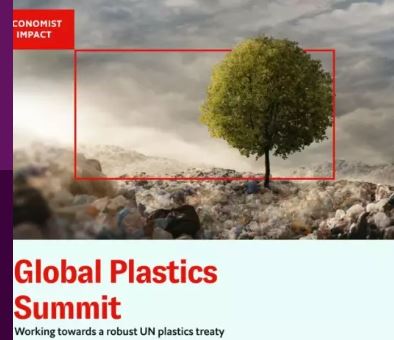Global Plastic Policy Centre experts in Bangkok this week to share knowledge ahead of next round of Plastics Treaty negotiations
Revolution Plastics Institute
With effective policy options set to be a key component of the Global Plastics Treaty, experts from around the world will meet at the Economist Impact Plastics Summit in Bangkok this week.
 With effective policy options set to be a key component of the Global Plastics Treaty, experts from around the world will meet at the Economist Impact Plastics Summit in Bangkok this week.
With effective policy options set to be a key component of the Global Plastics Treaty, experts from around the world will meet at the Economist Impact Plastics Summit in Bangkok this week.
Among them will be members of the University of Portsmouth’s Global Plastics Policy Centre (GPPC), who will be facilitating a workshop for delegates on the role of reuse systems in the transition to a circular plastics economy. Having recently published a detailed plan to transform product packaging and cut plastic production and pollution through reuse systems, the GPPC team is well placed to help facilitate meaningful discussions on reuse.
Through extensive evidence-based research we believe it is possible to swap wasteful single-use packaging for reuse systems. There is no one-size-fits-all packaging material or system for reuse, but it has huge untapped potential to reduce plastic pollution. What we need now is a clear vision for reuse and the right support to mainstream it.
Professor Steve Fletcher, Director of the Global Plastics Policy Centre
The Circular Economy for Plastics workshop will explore the policy levers and system changes needed for a circular economy and how appropriate measures on reuse could be incorporated into the global plastics treaty.
The Summit is the largest gathering of stakeholders ahead of the next round of plastic treaty negotiations at INC 3 in November. More than 500 delegates from 100+ countries, academic institutions, industry and campaign groups will be talking plastic in Bangkok. They will all have one thing on their mind – solving the global plastics crisis.
The GPPC team will share their independent, evidence-based analysis and advice on plastics policy from over 100 world-wide policies they have researched.
It is important to stimulate conversations around reuse ahead of INC3. This summit is the biggest convening of delegates involved in the treaty process ahead of INC3. Many of the major players in the plastics space will be there so it’s an opportunity for delegates to come together to inform positions ahead of the next round of negotiations.
Antaya March, Research Lead at the Global Plastics Policy Centre
Professor Steve Fletcher, Director of the Global Plastics Policy Centre said: “Through extensive evidence-based research we believe it is possible to swap wasteful single-use packaging for reuse systems. There is no one-size-fits-all packaging material or system for reuse, but it has huge untapped potential to reduce plastic pollution. What we need now is a clear vision for reuse and the right support to mainstream it.”
Antaya March, Research Lead at the Global Plastics Policy Centre, said: “It is important to stimulate conversations around reuse ahead of INC3. This summit is the biggest convening of delegates involved in the treaty process ahead of INC3. Many of the major players in the plastics space will be there so it’s an opportunity for delegates to come together to inform positions ahead of the next round of negotiations.”
The GPPC team will also add their expertise to other sessions during the two-day Summit in Bangkok, including supporting Common Seas to deliver a workshop on plastics policies in small island states and contributing to a panel on the mission-critical elements of the treaty ahead of INC3.
